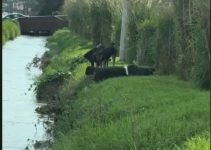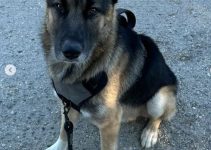
Dog Rushed to Vet After Accidental Cannabis Consumption During a Walk
An eight-year-old West Highland terrier dog, Oscar, has been rushed to the vet after he accidentally consumed cannabis during a beach walk with the owner, Stephen Davidson.
According to SWNS report, the 59-year-old Stephen Davidson took his usual route along the Sheerness, Kent seafront with Oscar, on Saturday, July 27th.
However, Oscar’s behavior changed dramatically after the walk. The typically “loveable and clingy” terrier became lethargic, disinterested, and stopped drinking water, raising concerns about dehydration and even death.
A visit to the People’s Dispensary for Sick Animals (PDSA), a veterinary charity based in the United Kingdom revealed that Oscar had eaten cannabis. The vet confirmed this after inducing vomiting and observing a delay in Oscar’s reaction.
“They put something down his throat to see if he would gag straight away but he didn’t – there was a delay. That’s when they said he’d been drugged,” Davisdon reportedly said.
Following the cannabis consumption confirmation, Oscar remained hospitalized overnight with intravenous fluids and charcoal medication to flush the cannabis from his system. Oscar later fully recovered and back to his playful self, leaving Davidson with close to $1,000 in vet bills that he hopes pet insurance will cover.

Dog Rushed to Vet After Accidental Cannabis Consumption During a Walk
Davidson, however has issued strong warning to pet owners after the incident.“I just want people to be extra careful of what their dogs pick up and be aware of any dangers when walking them,” he said.
He also expressed his concern about the careless cannabis users who discard their drugs on the ground. “It’s so bad in this town,” Davidson said. “People are just smoking it anywhere and then they throw it on the ground.”
Although feeling unsafe returning to Sheerness seafront which is just few minutes away from his house, the 59-year-old says he will eventually return to his usual dog walking spot.
Nina Downing, a nurse with the PDSA, told SWNS that dogs can easily ingest cannabis — or any drug — while on walks in public.
“Unfortunately, it can be the case that your dog may come across some cannabis while out and about on a walk, and if they ingest it, they will likely start to appear unwell.
“If you suspect your dog may have eaten some cannabis, it’s a good idea to have them checked over by your vet as soon as possible, rather than waiting for symptoms to appear.”
Cannabis (Marijuana) Intoxication in Dogs
Dogs just like human can be intoxicated by canabis. Dogs are even more susceptible to the effects of cannabis than man due to the higher cannabinoid receptors in their brains. A small amount of cannabis in a dogs system can cause intoxication or severe illness.
Common ways dogs are exposed to cannabis include:
- Ingestion of edibles: dogs can be exposed to cannabis through consumption of an edible that contain a certain amount of the drug in it, such as chips, candies, baked food.
- Direct consumpton: dogs can ingest cannabis directly when not kept out of their reach.
- Secondhand smoke: Inhalation of cannabis smoke can also lead to intoxication
Signs of Intoxication in Dogs
Dogs can react dramatically to cannabis, and the severity of their reaction depends on several factors. The method of exposure and the amount consumed are key determinants in how a dog will respond. Additionally, individual factors like size, age, and overall health can influence the outcome.
Common signs of intoxication in dogs includes the following:
- Vomiting
- Diarrhea
- Loss of appetite
- Lethargy
- Excessive drooling
- Tremors or shaking
- Seizures
- Difficulty breathing
- Abnormal heart rate
- Dilated or constricted pupils
- Incoordination or stumbling
- Behavioral changes
If you notice any of these signs in your dog, kindly take them to a vet immediately for further diagnosis and treatment.
Preventing Intoxication
Dogs possess a strong sense of smell and a natural curiosity, which can lead them to explore and potentially ingest harmful substances. To protec your ddogs from intoxication:
- Securely store all medications out of their reach.
- Be mindful of toxic plants in your home and garden.
- Research safe foods for dogs and avoid feeding them anything unfamiliar.
- Supervise your dog closely, especially outdoors.
- Keep them away from smoking environment to avoid second hand smoke


